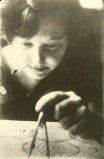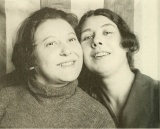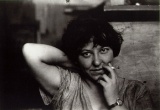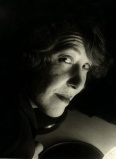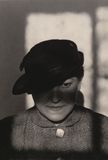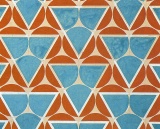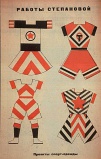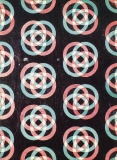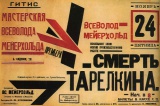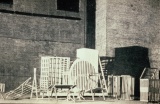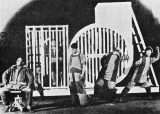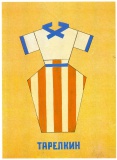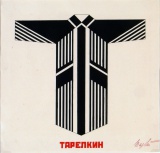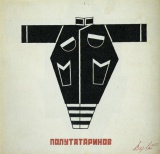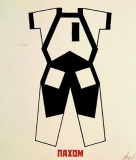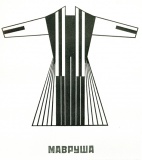Varvara Stepanova
 Stepanova in Moscow, 1916. | |
| Born |
November 5, 1894 Kovno, Russian Empire (today Kaunas, Lithuania) |
|---|---|
| Died |
May 20, 1958 (aged 63) Moscow, Soviet Union |
| Collections | Costakis, MoMA, Tretyakov, Thyssen, Pompidou, RGALI |
Varvara Fyodorovna Stepanova (Варвара Фёдоровна Степанова) was a Russian artist associated with the Constructivist movement.
Life and work[edit]
Born 1894 in Kovno (now Kaunas, Lithuania) to the peasant family. c1910-11 studies at the Kazan School of Art, Odessa, where she meets Rodchenko whom she subsequently marries. 1912 moves to Moscow, attends the Stroganov School (1913-14) and studies under Mikhail Leblan, Konstantin Yuon, and Ilya Mashkov. 1914 gives private art lessons, exhibits at the Moscow Salon. 1915-17 works as an accountant and secretary in a factory. 1916 with Rodchenko leases an appartment owned by Kandinsky. 1917 experiments with non-objective art and begins to create experimental non-objective visual poetry. 1918 produces collaged and handwritten books, including Rtny Khomle, Zigra Ar and her masterpiece Gaust Chaba, in which she wrote her zaum' text on newspaper. 1918 contributes to the First Exhibition of the Young Leftist Federation of the Professional Union of Artists and Painters and the Fifth State Exhibition. After the Revolution she works in the Museums office of the IZO Narkompros (Visual Arts Section of the People's Commissariat for Enlightenment). 1919 contributes to the Tenth State Exhibition: Non-Objective Creativity and Suprematism. 1919 becomes involved with the Futurist poets, composing zaum ('transrational') poetry herself; illustrates Alexei Kruchenykh's book Gly-Gly. 1919 begins making works in a style that by 1921 came to be known as Constructivism. 1920-23 participates in discussions and activities of INKhUK, in Moscow, as a member and, in 1920-21, as research secretary. 1921 contributes to the exhibition 5x5=25. 1920-25 teaches at the Krupskaia Academy of Social (Communist) Education. 1922 makes collages for the journal Kino-fot. 1922 designs sets and costumes for Vsevolod Meyerhold's production of The Death of Tarelkin at the Theater of the Revolution. 1922 makes series of linocuts on the subject of Charlie Chaplin. 1922 contributes to Berlin's First Russian Art Exhibition. 1923-28 closely involved with the journals LEF and Novyi Lef. 1923-25, with Lyubov Popova, becomes designer of textiles at the Tsindel (First State Textile Factory) near Moscow. 1924-25 professor of textile design at the Vkhutemas. 1925 contributes to the Exposition Internationale des Arts Décoratifs et Industriels Modernes in Paris. 1926-32 works predominantly as a book and journal designer, fulfilling major government commissions. 1930s-50s continues to paint, design, and exhibit. 1941-42 lives in Perm. 1958 dies in Moscow.
Portraits[edit]
Stepanova drawing textile designs, 1924. Photographed by Alexander Rodchenko.
With Lyubov Popova, Moscow, 1924. Photo by Rodchenko.
1936. Photo by Rodchenko. MoMA.
Works[edit]
Designs for sports clothing, 1923. Published in LEF.
Tarelkin's Death[edit]
Stepanova's set for Tarelkin's Death, 1922.
Scene from Tarelkin's Death directed by Meyerhold, Moscow, 1922.
Stepanova's costume design for Tarelkin's Death, 1922.
Stepanova's costume design for Tarelkin's Death, 1922.
Stepanova's costume design for Tarelkin's Death, 1922.
Stepanova's costume design for Tarelkin's Death, 1922.
Stepanova's costume design for Tarelkin's Death, 1922.
Stepanova's costume design for Tarelkin's Death, 1922.
Collections[edit]
- Stepanova in the George Costakis Collection
- Stepanova in the MoMA collection
- Stepanova in the Tretyakov Gallery collection
Writings[edit]
- Chelovek ne mozhet zhit bez chuda. Pisma. Poeticheskie opyty. Zapiski khudozhnitsy [Человек не может жить без чуда. Письма. Поэтические опыты. Записки художницы], eds. Alexander Lavrentiev (А. Н. Лаврентьев) and Varvara Rodchenko (В. А. Родченко), Moscow: Sfera, 1994, 304 pp. (Russian)
Catalogues[edit]
- Rodcenko/Stepanova, Perugia: Palazzo dei Priori and Palazzo Cesaroni, 1984.
- Aleksandr M. Rodchenko and Varvara F. Stepanova: The Future Is Our Only Goal, ed. Peter Noever, Munich: Prestel, 1991, 260 pp. With essays by Alexander Lavrentiev and Angela Völker; trans. Mathew Frost, Paul Kremmel, and Michael Robinson. (German),(English)
- Exter, Goncharova, Popova, Rozanova, Stepanova, Udaltsova: Amazons of the Avant-Garde, eds. John E. Bowlt and Matthew Drutt, New York: Solomon R. Guggenheim Museum, 2000. (English)
Literature[edit]
- Books
- Alexander Lavrentiev, Varvara Stepanova: una vita costruttivista, intro. Nicoletta Misler, Milan: Idea Books, 1988, 189 pp. Biography. (Italian)
- Varvara Stepanova: The Complete Work, ed. & intro. John E. Bowlt, trans. Wendy Salmond, MIT Press, 1988, 190 pp; UK ed. as Varvara Stepanova: A Constructivist Life, London: Thames and Hudson, 1988, 190 pp. [1] (English)
- Warwara Stepanova: ein Leben für den Konstruktivismus, intro. John E. Bowlt, trans. Ala Smeljanskaja, Ina Schneider and Siegfried Rother, Weingarten: Kunstverlag Weingarten, 1988, 191 pp. (German)
- Varvara Stepanova: une vie constructiviste, Paris: Philippe Sers, 1988, 190 pp. (French)
- Varvara Stepanova [Варвара Степанова], Moscow: Russkiy avangard, 2009, 249 pp. (Russian)
- Alexander Lavrentiev, VARST: geometricheskie tsvety na konstruktivnom pole [ВАРСТ: геометрические цветы на конструктивном поле], Moscow: Grant, 2002, 31 pp. (Russian)
- Book chapters, papers and articles
- Camilla Gray, The Russian Experiment in Art, 1863-1922, Thames and Hudson, 1962. (English)
- Evgeny Kovtun, "Das Antibuch der Warwara Stepanova/Varvara Stepanova's Anti-book", in John E. Bowlt, et al., Von der Flaeche zum Raum/From Surface to Space. Russland/Russia 1916-1924, Cologne: Galerie Gmurzynska, 1974, pp 57-64, 142-151. (German)/(English)
- Alexander Lavrentiev, "V.F.Stepanova o rannem konstruktivizme", Trudy VNIITE Tekhnicheskaia estetika 21 (1979), Moscow, pp 111-117. (Russian)
- Alexander Lavrentiev, "Poeziia graficheskogo dizaina v tvorchestve Varvary Stepanovoi", Trudy VNIITE Tekhnicheskaia estetika 5 (1980), Moscow, pp 22-26. (Russian)
- "The Graphics of Visual Poetry in the Work of Varvara Stepanova", Grafik 1 (1982), Budapest, pp 46-51. (English)
- Alma Law, "The Death of Tarelkin: A Constructivist Vision of Tsarist Russia", Russian History 8, parts 1-2 (1982), pp 145-198. [2] (English)
- Lydya Zaletova, Revolutionary Costume: Soviet Clothing and Textiles of the 1920s, trans. Elizabeth Dafinone, New York: Rizzoli, 1989. Review. (English)
- Miuda Yablonskaya, "Varvara Stepanova", in Yablonskaya, Women Artists of Russia's New Age, 1900-1935, trans. Anthony Parton, New York: Rizzoli, 1990, pp 141-156. (English)
- Alexander Lavrentiev, "Varvara Stepanova", in Amazons of the Avant-Garde, eds. John E. Bowlt and Matthew Drutt, New York: Solomon R. Guggenheim Museum, 2000, pp 240-269. (English)
- Christina Kiaer, "The Russian Constructivist Flapper Dress", Critical Inquiry 28:1: "Things" (Autumn 2001), pp 185-243. (English)
- Charlotte Greve, "Poetry of the future, Varvara Stepanova's visual poetry, 1918-1919", in Writing and the 'Subject': Image-Text Relations in the Early Russian Avant-Garde and Contemporary Russian Visual Poetry, Amsterdam: University of Amsterdam, 2004, pp 163-215. Ph.D. Dissertation. (English)
- Irina Aristarkhova, "Stepanova's 'Laboratories'", in Place Studies, eds. Andreas Broeckmann and Gunalan Nadarajan, 2008, pp 167-182. (English)
See also[edit]
Links[edit]
- Selected designs
- Stepanova's biography (Russian)
- Biographical article on Rodchenko and Stepanova, 2001. (Russian)
- Stepanova at Wikipedia


